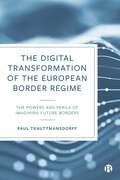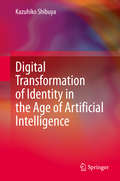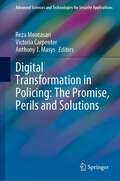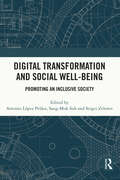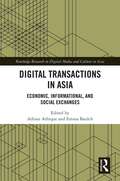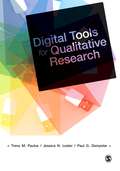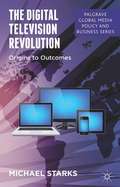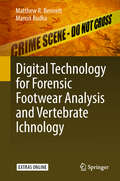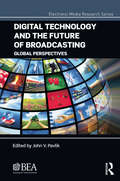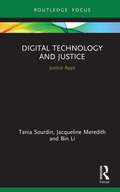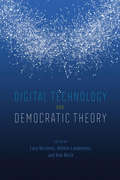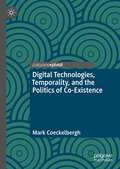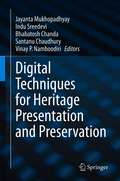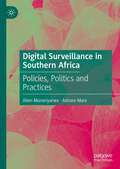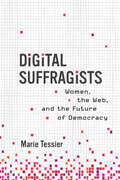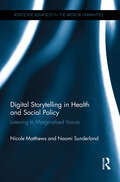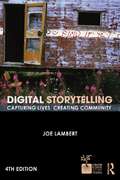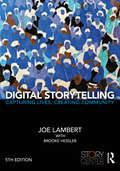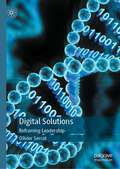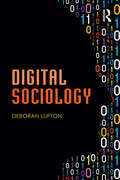- Table View
- List View
The Digital Transformation of the European Border Regime: The Powers and Perils of Imagining Future Borders
by Paul TrauttmansdorffThis book offers an in-depth investigation into the digitisation processes of Europe’s border regime. It shows how sociotechnical imaginations of future borders drive forward the expansion of databases in the European governance of mobility. With a focus on the European Union Agency eu-LISA, one of the most significant and rapidly advancing actors in the digital border regime, the book serves as a gateway to understanding the key agents, visions, technologies and practices at work. Asking broader questions about exclusion, discrimination, violence and mobility rights, this is an original contribution to our understanding of future borders in Europe.
Digital Transformation of Identity in the Age of Artificial Intelligence
by Kazuhiko ShibuyaThis book examines the digital transformation of identity in the age of artificial intelligence. It articulates the nature of identity of human beings, based on cutting-edge knowledge in the field of AI and big-data sciences, and discusses identity by drawing on comprehensive investigations in digital social sciences and exploring wider disciplines related to philosophy, ethics, sociology, STS, computer sciences, engineering, and medical sciences. Reviewing contemporary conditions proliferated by advanced technological trends and unveiling social mechanisms of human identity, this book appeals to undergraduate and graduate students as well as academic researchers.
Digital Transformation in Policing: The Promise, Perils and Solutions (Advanced Sciences and Technologies for Security Applications)
by Reza Montasari Victoria Carpenter Anthony J. MasysThis book shares essential insights into how the social sciences and technology could foster new advances in managing the complexity inherent to the criminal and digital policing landscape. Said landscape is both dynamic and intricate, emanating as it does from crimes that are both persistent and transnational. Globalization, human and drug trafficking, cybercrime, terrorism, and other forms of transnational crime can have significant impacts on societies around the world. This necessitates a reassessment of what crime, national security and policing mean. Recent global events such as human and drug trafficking, the COVID-19 pandemic, violent protests, cyber threats and terrorist activities underscore the vulnerabilities of our current security and digital policing posture.This book presents concepts, theories and digital policing applications, offering a comprehensive analysis of current and emerging trends in digital policing. Pursuing an evidence-based approach, it offers an extraordinarily perceptive and detailed view of issues and solutions regarding the crime and digital policing landscape. To this end, it highlights current technological and methodological solutions as well as advances concerning integrated computational and analytical solutions deployed in digital policing. It also provides a comprehensive analysis of the technical, ethical, legal, privacy and civil liberty challenges stemming from the aforementioned advances in the field of digital policing; and accordingly, offers detailed recommendations supporting the design and implementation of best practices including technical, ethical and legal approaches when conducting digital policing. The research gathered here fits well into the larger body of work on various aspects of AI, cybersecurity, national security, digital forensics, cyberterrorism, ethics, human rights, cybercrime and law. It provides a valuable reference for law enforcement, policymakers, cybersecurity experts, digital forensic practitioners, researchers, graduates and advanced undergraduates, and other stakeholders with an interest in counter-terrorism. In addition to this target audience, it offers a valuable tool for lawyers, criminologist and technology enthusiasts.
Digital Transformation in Journalism and News Media
by Mike Friedrichsen Yahya KamalipourThis book analyzes various digital transformation processes in journalism and news media. By investigating how these processes stimulate innovation, the authors identify new business and communication models, as well as digital strategies for a new environment of global information flows. The book will help journalists and practitioners working in news media to identify best practices and discover new types of information flows in a rapidly changing news media landscape.
Digital Transformation and Social Well-Being: Promoting an Inclusive Society
by Antonio López Peláez Sang-Mok Suh Sergei ZelenevThis is the first book to show how digitalisation and the better provision of information and communication technologies (ICTs) can improve access to a wide-range of social services, as well as make them more inclusive. Overcoming disparities across social groups using contemporary digitalisation models will have lasting consequences on social well-being and human welfare.Reflecting on current trends the authors vividly illustrate the collective, global nature of the challenge that digitalisation represents for providers, administrators and users of welfare services. It is important, therefore, to bear in mind the following for research design and practice: • Citizens' rights must be protected. • Consideration should be given to how the services provided can be improved by more effective use of ICTs. • Digital interventions require better service coordination in the setting of priorities and specific training in digital skills for service providers and service users. The chapters in this book address these problems and challenges in great depth, analysing the role of ICTs in promoting social inclusion and social welfare, drawing on examples of successful ICT applications around the world. The book contains country case-studies from the United States, Brazil, India, the Republic of Korea, Taiwan, Hong Kong (China), Zimbabwe, Morocco, Spain, Portugal, Ireland and Singapore and will be of interest to all scholars and students of social policy, to social work educators, and social care providers.
Digital Transactions in Asia: Economic, Informational, and Social Exchanges (Routledge Research in Digital Media and Culture in Asia)
by Adrian Athique Emma BaulchThis book presents a comprehensive overview of transactional forms of the digital across the Asian region by addressing the platforms and infrastructures that shape the digital experience. Contributors argue that each and every encounter mediated by the digital carries with it a functional exchange, but at the same time each transaction also implies an exchange based on social relationships for the digital age. In capturing the digital revolution through case studies of economic, informational, and social exchanges from across the larger Asian region, the book offers a richly contextualized and comparative account of the pervasive nature of the digital as both a medium for action and a medium of record.
Digital Tools for Qualitative Research
by Paul Dempster Jessica Nina Lester Trena PaulusDigital Tools for Qualitative Research shows how the research process in its entirety can be supported by technology tools in ways that can save time and add robustness and depth to qualitative work. It addresses the use of a variety of tools (many of which may already be familiar to you) to support every phase of the research process, providing practical case studies taken from real world research. The text shows you how to select and use technology tools to: engage in reflexivity collaborate with other researchers and stakeholders manage your project do your literature review generate and manage your data transcribe and analyse textual, audio and visual data and represent and share your findings. The book also considers important ethical issues surrounding the use of various technologies in each chapter. On the companion website, you'll find lots of additional resources including video tutorials and activities. Whether you're a novice or expert social researcher, this book will inspire you to think creatively about how to approach your research project and get the most out of the huge range of tools available to you.
Digital Timescapes: Technology, Temporality and Society
by Rob KitchinDigital technologies are having a profound effect on the temporalities of individuals, households and organisations. We now expect to be able to instantly source a vast array of information at any time and from anywhere, as well as buy goods with the click of a button and have them delivered within hours, while time management apps and locative media have altered how everyday scheduling and mobility unfolds.Digital Timescapes makes the case that we have transitioned to an era where the production and experience of time is qualitatively different to the pre-digital era. Rob Kitchin provides a synoptic account of this transition, charting how digital technologies, in a wide range of manifestations, are reconfiguring everyday temporalities. Attention is focused on the temporalities associated with six sets of everyday practices: history and memory; politics and policy; governance and governmentality; mobility and logistics; planning and development; and work and labour. Critically, how to challenge and reorder digitally mediated temporal power is examined through the development of an ethics of temporal care and temporal justice.Conceptually and empirically rich, Digital Timescapes is an essential guide to our new temporal regime. It will be of interest to students and scholars of Media Studies, Science and Technology Studies, Sociology, Anthropology, Human Geography, and History and Memory Studies, as well as those who are interested in how digital technologies are transforming society.
The Digital Television Revolution: Origins To Outcomes (Palgrave Global Media Policy and Business)
by Michael StarksThis account of the global switch to digital television, from its origins to its emerging outcomes, provides an understanding of how digital television is converging with the Internet. It pictures a future in which the democratic role of the media, freedom of expression and democratic participation can be enhanced.
Digital Technology for Forensic Footwear Analysis and Vertebrate Ichnology
by Marcin Budka Matthew R. Bennett“There is no branch of detective science which is so important and so much neglected as the art of tracing footsteps. Happily, I have always laid great stress upon it, and much practice has made it second nature to me.” Sherlock Holmes, Study of Scarlet.Despite the fictional nature of Sherlock Holmes this statement rings true today. The study of footwear is neglected in modern forensic practice and does have much to offer. What it needs is an injection of technology and modern analytical tools. These tools are emerging from the digital revolution currently transforming vertebrate ichnology. Ichnology is the discipline of earth science which focuses on the study of trace fossils such as footprints. This book draws upon both disciplines - geology (ichnology) and forensic science - to show how the two have much to learn from each other especially with regard to the digital capture and analysis of footprints. This book presents field and laboratory methods associated with the collection, analysis and presentation of three-dimensional tracks (footprints) whether from a crime scene or a geological/archaeological excavation. It shows students, researchers and practitioners how to collect and analyse 3D data and take advantage of the digital revolution transforming ichnology. This book is not only essential reading for forensic and earth science students but also for professional forensic practitioners as well as for applied computer scientists developing new tools for visualization and analysis of 3D data. The book forms a natural methods focused complement to the successful text Fossilised Locomotion published by Springer 2014.
Digital Technology and the Future of Broadcasting: Global Perspectives (Electronic Media Research Series)
by John V. PavlikThis volume presents timely discussions on how digital technology is reshaping broadcasting and the media in the United States and around the world. It features contributions from distinguished scholars and young researchers, representing work that spans domestic and international issues of technological change and the implications for broadcasting and related media in a global context. Among the many issues covered are: The impact of digital technology on the structure of broadcasting organizations and regulation; The nature of broadcast content or media programming and how it is delivered at home and abroad; Engagement and interaction of the public with broadcasting and social and mobile media; and The reshaping of revenue models for broadcasters and media organizations globally. The first two parts of the volume, addressing research challenges, issues, and advances in global broadcasting, are competitively reviewed research papers which were presented at the BEA2014 Research Symposium. The third part focuses on international perspectives, with chapters from broadcasting scholars and paper discussants at the Research Symposium. This section provides reflection on the problems and prospects for research, education, and public policy that arise in this era of rapid and continuing change. As a benchmark of the remarkable changes taking place in today’s media environment, the volume sets an agenda for future research on the implications of digital technology for broadcasting and broadcasting education.
Digital Technology and Justice: Justice Apps
by Tania Sourdin Jacqueline Meredith Bin LiJustice apps – mobile and web-based programmes that can assist individuals with legal tasks – are being produced, improved, and accessed at an unprecedented rate. These technologies have the potential to reshape the justice system, improve access to justice, and demystify legal institutions. Using artificial intelligence techniques, apps can even facilitate the resolution of common legal disputes. However, these opportunities must be assessed in light of the many challenges associated with app use in the justice sector. These include the digital divide and other accessibility issues; the ethical challenges raised by the dehumanisation of legal processes; and various privacy, security, and confidentiality risks. Surveying the landscape of this emergent industry, this book explores the objectives, opportunities, and challenges presented by apps across all areas of the justice sector. Detailed consideration is also given to the use of justice apps in specific legal contexts, including the family law and criminal law sectors. The first book to engage with justice apps, this book will appeal to a wide range of legal scholars, students, practitioners, and policy-makers.
Digital Technology and Democratic Theory
by Hélène Landemore Rob Reich Lucy BernholzOne of the most far-reaching transformations in our era is the wave of digital technologies rolling over—and upending—nearly every aspect of life. Work and leisure, family and friendship, community and citizenship have all been modified by now-ubiquitous digital tools and platforms. Digital Technology and Democratic Theory looks closely at one significant facet of our rapidly evolving digital lives: how technology is radically changing our lives as citizens and participants in democratic governments. To understand these transformations, this book brings together contributions by scholars from multiple disciplines to wrestle with the question of how digital technologies shape, reshape, and affect fundamental questions about democracy and democratic theory. As expectations have whiplashed—from Twitter optimism in the wake of the Arab Spring to Facebook pessimism in the wake of the 2016 US election—the time is ripe for a more sober and long-term assessment. How should we take stock of digital technologies and their promise and peril for reshaping democratic societies and institutions? To answer, this volume broaches the most pressing technological changes and issues facing democracy as a philosophy and an institution.
Digital Technologies, Temporality, and the Politics of Co-Existence
by Mark CoeckelberghOur digital existence is hurried and fast. We are tied to the present, or perhaps we are not present enough: immersed in digital social media and processes by artificial intelligence, we are hardly present to ourselves and to others, and feel alienated from nature. We are also made to fear climate change and the end of humanity. How can we live a good life and give meaning to our lives under these conditions? How can and should we co-exist today?Using process philosophy, narrative theory, and the concept of technoperformances, this book analyzes how digital technologies shape our relation to time and our existence, and discusses what this means in the light of climate change and new technologies such as AI. In dialogue with contemporary philosophy of technology and media theory and asking original questions about finding common times in what it calls the “Anthropochrone”, it proposes a conceptual framework that helps us to understand how we (should) exist and relate to time today.
Digital Technologies in Construction Engineering: Selected Papers (Lecture Notes in Civil Engineering #173)
by Sergey Vasil’yevich KlyuevThis book gathers the latest advances, innovations, and applications in the field of construction engineering, as presented by researchers and engineers at the Digital Technologies in Construction Engineering conference, held in Belgorod, Russia, on June 8-9, 2021. It covers highly diverse topics, including industrial and civil construction, building materials; environmental engineering and protection; sustainability; structure safety and special construction structures. The contributions, which were selected by means of a rigorous international peer-review process, highlight numerous exciting ideas that will spur novel research directions and foster multidisciplinary collaborations.
Digital Techniques for Heritage Presentation and Preservation
by Jayanta Mukhopadhyay Indu Sreedevi Bhabatosh Chanda Santanu Chaudhury Vinay P. NamboodiriThis book describes various new computer based approaches which can be exploited for the (digital) reconstruction, recognition, restoration, presentation and classification of digital heritage. They are based on applications of virtual reality, augmented reality and artificial intelligence, to be used for storing and retrieving of historical artifacts, digital reconstruction, or virtual viewing.The book is divided into three sections: “Classification of Heritage Data” presents chapters covering various domains and aspects including text categorization, image retrieval and classification, and object spotting in historical documents. Next, in “Detection and Recognition of Digital Heritage Artifacts”, techniques like neural networks or deep learning are used for the restoration of degraded heritage documents, Tamil Palm Leaf Characters recognition, the reconstruction of heritage images, and the selection of suitable images for 3D reconstruction and classification of Indian land mark heritage images. Lastly, “Applications of Modern Tools in Digital Heritage” highlights some example applications for dance transcription, architectural geometry of early temples by digital reconstruction, and computer vision based techniques for collecting and integrating knowledge on flora.This book is mainly written for researchers and graduate students in digital preservation and heritage, or computer scientists looking for applications of virtual reality, computer vision, and artificial intelligence techniques.
Digital Surveillance in Southern Africa: Policies, Politics and Practices
by Allen Munoriyarwa Admire MareThis book critically examines the manifest and latent practices of surveillance in the southern African region, using case studies from South Africa, Zimbabwe, Zambia, Namibia, Botswana and Mozambique. The book demonstrates the growing role of super-powers in the construction and normalization of the surveillance state. It traces the digitization of surveillance practices to the rapid adoption of smart CCTV, facial recognition technologies and EMSI catchers. Through predictive policing mechanisms, state security agencies have appropriated digital media technologies for sentiment analysis, constant monitoring of digital footprints of security targets, and even deploying cyber-troops on popular social media platforms. The authors argue that surveillance practices have thus been digitized with deleterious impact on the right to privacy, peaceful assembly and freedom of expression in the region. Furthermore, they argue that specific laws and regulations governing surveillance practices in the region are lagging behind. Finally, the book demonstrates how digital surveillance have significantly infiltrated the political, economic and social fabric of Southern Africa. This book provides much needed systematic, cutting-edge research into the trends, practices, policies and geo-political interests at the center of surveillance practices in the region, providing a crucial link between human rights, such as freedom of privacy and expression, and political authoritarianism.
Digital Suffragists: Women, the Web, and the Future of Democracy
by Marie TessierWhy women&’s voices are outnumbered online and what we can do about it, by a New York Times comment moderator.If you&’ve read the comments posted by readers of online news sites, you may have noticed the absence of women&’s voices. Men are by far the most prolific commenters on politics and public affairs. When women do comment, they are often attacked or dismissed more than men are. In fact, the comment forums on news sites replicate conditions of the offline and social media worlds, where women are routinely interrupted, threatened, demeaned, and called wrong, unruly, disgusting, and out of place. In Digital Suffragists, Marie Tessier—a veteran journalist and a New York Times comment moderator for more than a decade—investigates why women&’s voices are outnumbered online and what we can do about it. The suffragists of the early twentieth century were jailed for trying to vote. Can a twenty-first century democracy be functional when half of the population is not fully represented in a primary form of political communication? Tessier shows that for online comments, it&’s a design problem: the linear blog comment formula was based on deeply gender-biased assumptions. Technologies designed with a broad range of end users in mind, she points out, are more successful and beneficial than those that reflect the designer&’s own habits of mind. Tessier outlines benchmarks for a more democratic media, all of which stem from one fundamental idea: media must adopt gender and racial representation as key performance indicators. Equal speaking time for women is a measure of democracy.
Digital Storytelling in Health and Social Policy: Listening to Marginalised Voices (Routledge Advances in the Medical Humanities)
by Naomi Sunderland Nicole MatthewsAs digital life stories continue to assume more and more significance across a range of institutions, so too does their potential to bring into focus once marginalised and neglected voices. Breaking new ground by reframing multimedia life stories as a resource for education, public health, and policy, this book challenges policymakers, professionals, and researchers to reimagine how they find out about and respond to people’s daily lives and experiences of health, disability, and well-being. The book develops theoretical, methodological, and practical resources for listening to digital stories through a series of carefully selected international case studies, from dementia care education to campaigns in the UN to ban cluster munitions. The case studies explore and illuminate different ways that digital stories have – and have not – been listened to in the past. The authors expose the great potential as well as the complexity of using powerful personal stories in practice. Together, the case studies highlight that processes of listening to, learning from, and making use of digital stories involve unavoidable processes of reinterpretation, recontextualisation, and translation which have significant ethical and political implications for storytellers, listeners, and society. In mapping and theorising the movement of stories into new contexts of policy and practice, the book offers a critical lens on the widely celebrated democratising potential of digital storytelling and its capacity to amplify marginalised voices. Digital Storytelling in Health and Social Policy develops an authoritative and original re-conceptualisation of digital life stories and their use for social justice ends, and will be important reading for researchers and practitioners from a range of backgrounds, including social policy, digital media, communication, education, disability, and public health.
Digital Storytelling
by Joe LambertListen deeply. Tell stories. This is the mantra of the Center for Digital Storytelling (CDS) in Berkeley California, which, since 1998 has worked with nearly 1,000 organizations around the world and trained more than 15,000 people in the art of digital storytelling. In this revised and updated edition of the CDS's popular guide to digital storytelling, co-founder Joe Lambert details the history and methods of digital storytelling practices. Using a "7 Steps" approach, Lambert helps storytellers identify the fundamentals of dynamic digital storytelling--from seeing the story, assembling it, and sharing it. As in the last edition, readers of the fourth edition will also find new explorations of the applications of digital storytelling and updated appendices that provide resources for budding digital storytellers, including information about past and present CDS-affiliated projects and place-based storytelling, a narrative-based approach to understanding experience and landscape. A companion website further brings the entire storytelling process to life. Over the years, the CDS's work has transformed the way that community activists, educators, health and human services agencies, business professionals, and artists think about story, media, culture, and the power of personal voice in creating change. For those who yearn to tell multimedia stories, Digital Storytelling is the place to begin.
Digital Storytelling: Capturing Lives, Creating Community
by Joe Lambert Brooke HesslerIn this revised and updated edition of the StoryCenter's popular guide to digital storytelling, StoryCenter founder Joe Lambert offers budding storytellers the skills and tools they need to craft compelling digital stories. Using a "Seven Steps" approach, Lambert helps storytellers identify the fundamentals of dynamic digital storytelling – from conceiving a story, to seeing, assembling, and sharing it. Readers will also find new explorations of the global applications of digital storytelling in education and other fields, as well as additional information about copyright, ethics, and distribution. The book is filled with resources about past and present projects on the grassroots and institutional level, including new chapters specifically for students and a discussion of the latest tools and projects in mobile device-based media. This accessible guide’s meaningful examples and inviting tone makes this an essential for any student learning the steps toward digital storytelling.
Digital Sports Journalism
by Charles M. LambertDigital Sports Journalism gives detailed guidance on a range of digital practices for producing content for smartphones and websites. Each chapter discusses a skill that has become essential for sports journalists today, with student-friendly features throughout to support learning. These include case studies, examples of sports journalism from leading global publications, as well as top tips and practical exercises. The book also presents interviews with leading sport and club journalists with wide-ranging experience at the BBC, Copa90, Wimbledon Tennis, the Guardian and BT Sport, who discuss working with new technologies to cover sports stories and events. Chapters cover: live blogging; making and disseminating short videos; working for a sports club or governing body; finding and transmitting stories on social media; podcasting; longform online journalism. The job of a sports journalist has altered dramatically over the first two decades of the 21st century, with scope to write content across a new variety of digital platforms and mediums. Digital Sports Journalism will help students of journalism and professionals unlock the potential of these new media technologies.
Digital Space and Embodiment in Contemporary Cinema: Screening Composite Spaces (Routledge Advances in Film Studies)
by Jennifer KirbyDigital Space and Embodiment in Contemporary Cinema examines how contemporary cinema has represented and engaged with the experience of simultaneously inhabiting digital and material spaces (i.e. "composite spaces") in the context of the growing ubiquitousness of digital media and culture. Bringing together a range of key cinematic texts, the book examines how these films represent "composite space" by depicting – often subtly and without explicit reference to technology – what it feels like to live in a world of ubiquitous digital media. The book explores composite spaces through the striking use of elements like colour, symbolic graphics and music, and covers topics like: music as mediator between levels of experience/perception in visionary films such as ‘Sucker Punch’ (2011) and ‘Spring Breakers’ (2012); digital colour as an interface in films including ‘Under the Skin’ (2013); the integration of digital graphical elements drawn from game spaces into material spaces in films such as ‘Scott Pilgrim vs The World’ (2010) and ‘Nerve’ (2016); and films that take place on a computer screen including 2020’s widely discussed, Zoom-produced pandemic horror film ‘Host’. Through the close analysis of these films, the book offers fresh perspectives on conceptual issues of embodiment, digital agency and subjectivity. This book is a valuable resource for advanced undergraduates, postgraduates and scholars in the fields of film studies, digital aesthetics and film theory, digital culture, and digital media.
Digital Solutions: Reframing Leadership
by Olivier SerratThis book acts as a valuable quick-access resource on the challenges and opportunities that the digital age presents to organizational leadership. Balanced, comprehensive, and thought-provoking, the book will be useful to professionals and practitioners. The book broadly follows a macro, meso, and micro approach to argumentation and is best read from beginning to end. The book synopsizes the historical context of technological revolutions and reflects on first-order results from enhanced use of information and communication technology in organizations; considers second-level impacts from information and communication technology on economy, society, work, and the very act of organizing; maps out core concepts of agility and principles that leaders should honor to exploit agility in newfound workforce ecosystems; showcases emerging leadership behaviors and mindsets; and specifies the good practice needed to plan and lead digital strategies. The book invites reference to the author's popular Knowledge Solutions: Tools, Methods, and Approaches to Drive Organizational Performance (2017) and the more recent Leading Solutions: Essays in Business Psychology (2021), which it both rests on and extends.
Digital Sociology
by Deborah LuptonWe now live in a digital society. New digital technologies have had a profound influence on everyday life, social relations, government, commerce, the economy and the production and dissemination of knowledge. People’s movements in space, their purchasing habits and their online communication with others are now monitored in detail by digital technologies. We are increasingly becoming digital data subjects, whether we like it or not, and whether we choose this or not. The sub-discipline of digital sociology provides a means by which the impact, development and use of these technologies and their incorporation into social worlds, social institutions and concepts of selfhood and embodiment may be investigated, analysed and understood. This book introduces a range of interesting social, cultural and political dimensions of digital society and discusses some of the important debates occurring in research and scholarship on these aspects. It covers the new knowledge economy and big data, reconceptualising research in the digital era, the digitisation of higher education, the diversity of digital use, digital politics and citizen digital engagement, the politics of surveillance, privacy issues, the contribution of digital devices to embodiment and concepts of selfhood and many other topics. Digital Sociology is essential reading not only for students and academics in sociology, anthropology, media and communication, digital cultures, digital humanities, internet studies, science and technology studies, cultural geography and social computing, but for other readers interested in the social impact of digital technologies.
